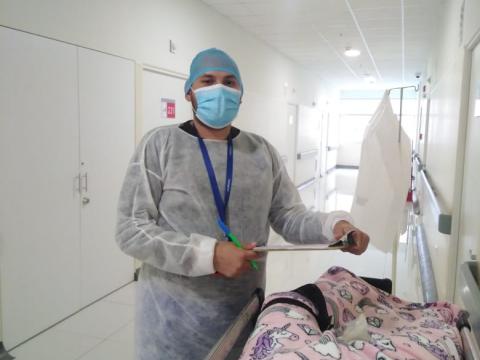Venezuelan and Peruvian doctors join forces to fight COVID-19 in Peru

José Miguel Tabares’ father died of cancer in late 2017 in Venezuela. He couldn’t afford the expensive treatment because his income wasn’t enough even to buy cold medicine. The family’s tragedy was a symptom of Venezuela’s collapsing economy and political crisis that has caused nearly 5.1 million Venezuelans to flee the country looking for safety, opportunity, and a better life. Millions more fight a daily battle for survival in a country struggling to keep the lights on, literally.
“In Venezuela the salary was not enough. Imagine if another of my relatives got sick and we had to decide between buying medicine or food. It was terrible,” says José Miguel, a doctor who worked as a medical resident of Gynecology and Obstetrics at José Antonio Vargas Hospital, in Caracas, Venezuela.
José Miguel is one of 50 medical professionals participating in World Vision’s "Certification Program for migrant doctors, nurses and professional technicians in Peru," supported by USAID. The program’s goal is to help Venezuelan medical professionals living in Peru re-enter the workforce in their specialty areas.
"We help doctors get the documents required by Sunedu and the Medical College,” says Sandra Contreras, national director of World Vision Peru. “We support them with a subsidy to cover the costs of the revalidation of their credentials, provide access to tuition for new training, if needed, and facilitate their presentation to the National Examination of Medicine. The idea is that they can exercise their profession here and support Peru in the fight against COVID-19.”
The difficult road to Peru
Back in Venezuela, the lack of income was not the only thing that afflicted José Miguel and his family. Robberies and insecurity were a normal part of life inside and outside the hospital. He remembers the day when criminals took over the hospital’s maternity ward. He was on call and because there was no electricity it was impossible to attend to a woman in labor.
“One of the patients threatened to kill me if I did not attend to her or if something happened to her son,” José Miguel says. “After that episode I said to myself: ‘that’s it.’ I decided to look for something better in another country. I chose Peru because it was one of the few countries that seemed easier to enter," he says.
So in May 2018, after five days of traveling by bus through Venezuela, Colombia, and Ecuador, José arrived in Lima. He received a friend and they shared a small room with six other people. On his second day in Peru, José went searching for work. He only had 10 soles (about $3). It wasn’t nearly enough to pay for rent, food, and bus fare. He ended up working whatever jobs he could find. In the beginning, he suffered a lot of discrimination for being a Venezuelan, he says.
José Miguel worked as a kitchen assistant, in a call center for a company selling natural products, sold alfajores and tamales on the street, and also as a janitor at a hostel. Then he found out about the help that USAID and World Vision were offering Venezuelan professionals living in Peru.
It was just what he needed to establish his new life as a doctor here in Peru.
Steady progress toward gainful employment
World Vision works with the Venezuelan Union in Peru to identify Venezuelan doctors who qualify for the certification program. They not only grant them the funds to go through the re-accreditation process, but they help the professionals recover and legally verify their credentials from Venezuela. This ensures that they meet Peru’s national standards. The union provides guidance to know how and where to apply, their job-placement options, etc., and trains them in soft skills to be more prepared for their interview.
Since February 2020, the program has been supporting 50 migrant doctors. Of this group, 37 passed the National Examination of Medicine and 21 of them have already registered to practice medicine in Peru. The remaining 16 are still waiting for be certificated.
Of the 21 doctors, 5 are already working. The goal is to have 50 to 80 registered Venezuelan doctors ready to practice their profession in Peru. Among the doctors are epidemiologists, pediatricians, cardiologists, and anesthesiologists who can join this fight against COVID-19.
This program will continue helping Venezuelan medical professionals like José Miguel until February 2021.
NOTE: The United States Government, through the United States Agency for International Development (USAID) and the NGO World Vision, allows foreign health professionals to validate their degrees and colleges to work in hospitals and save lives